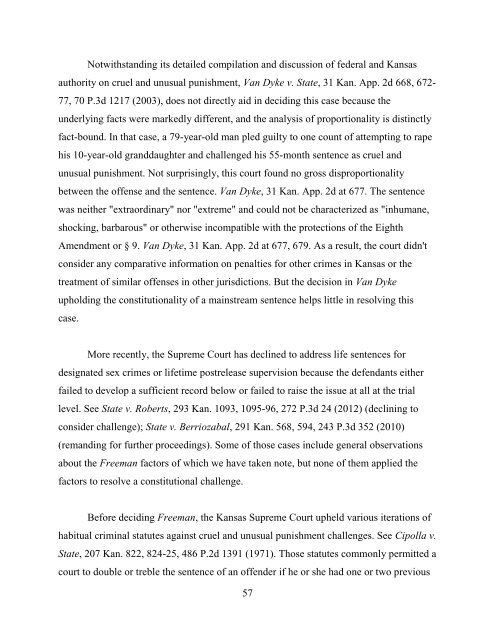State v. Proctor - Kansas Judicial Branch
State v. Proctor - Kansas Judicial Branch
State v. Proctor - Kansas Judicial Branch
Create successful ePaper yourself
Turn your PDF publications into a flip-book with our unique Google optimized e-Paper software.
Notwithstanding its detailed compilation and discussion of federal and <strong>Kansas</strong><br />
authority on cruel and unusual punishment, Van Dyke v. <strong>State</strong>, 31 Kan. App. 2d 668, 672-<br />
77, 70 P.3d 1217 (2003), does not directly aid in deciding this case because the<br />
underlying facts were markedly different, and the analysis of proportionality is distinctly<br />
fact-bound. In that case, a 79-year-old man pled guilty to one count of attempting to rape<br />
his 10-year-old granddaughter and challenged his 55-month sentence as cruel and<br />
unusual punishment. Not surprisingly, this court found no gross disproportionality<br />
between the offense and the sentence. Van Dyke, 31 Kan. App. 2d at 677. The sentence<br />
was neither "extraordinary" nor "extreme" and could not be characterized as "inhumane,<br />
shocking, barbarous" or otherwise incompatible with the protections of the Eighth<br />
Amendment or § 9. Van Dyke, 31 Kan. App. 2d at 677, 679. As a result, the court didn't<br />
consider any comparative information on penalties for other crimes in <strong>Kansas</strong> or the<br />
treatment of similar offenses in other jurisdictions. But the decision in Van Dyke<br />
upholding the constitutionality of a mainstream sentence helps little in resolving this<br />
case.<br />
More recently, the Supreme Court has declined to address life sentences for<br />
designated sex crimes or lifetime postrelease supervision because the defendants either<br />
failed to develop a sufficient record below or failed to raise the issue at all at the trial<br />
level. See <strong>State</strong> v. Roberts, 293 Kan. 1093, 1095-96, 272 P.3d 24 (2012) (declining to<br />
consider challenge); <strong>State</strong> v. Berriozabal, 291 Kan. 568, 594, 243 P.3d 352 (2010)<br />
(remanding for further proceedings). Some of those cases include general observations<br />
about the Freeman factors of which we have taken note, but none of them applied the<br />
factors to resolve a constitutional challenge.<br />
Before deciding Freeman, the <strong>Kansas</strong> Supreme Court upheld various iterations of<br />
habitual criminal statutes against cruel and unusual punishment challenges. See Cipolla v.<br />
<strong>State</strong>, 207 Kan. 822, 824-25, 486 P.2d 1391 (1971). Those statutes commonly permitted a<br />
court to double or treble the sentence of an offender if he or she had one or two previous<br />
57

















